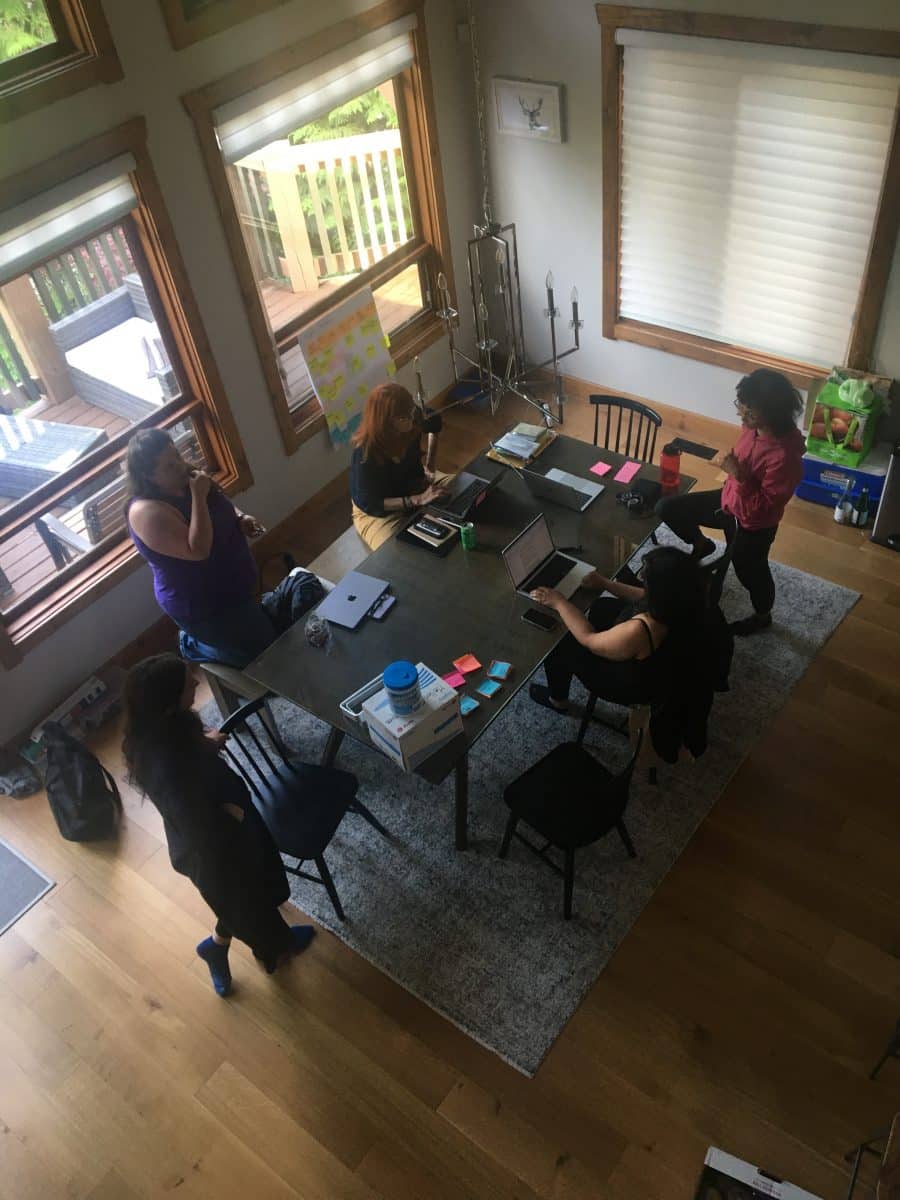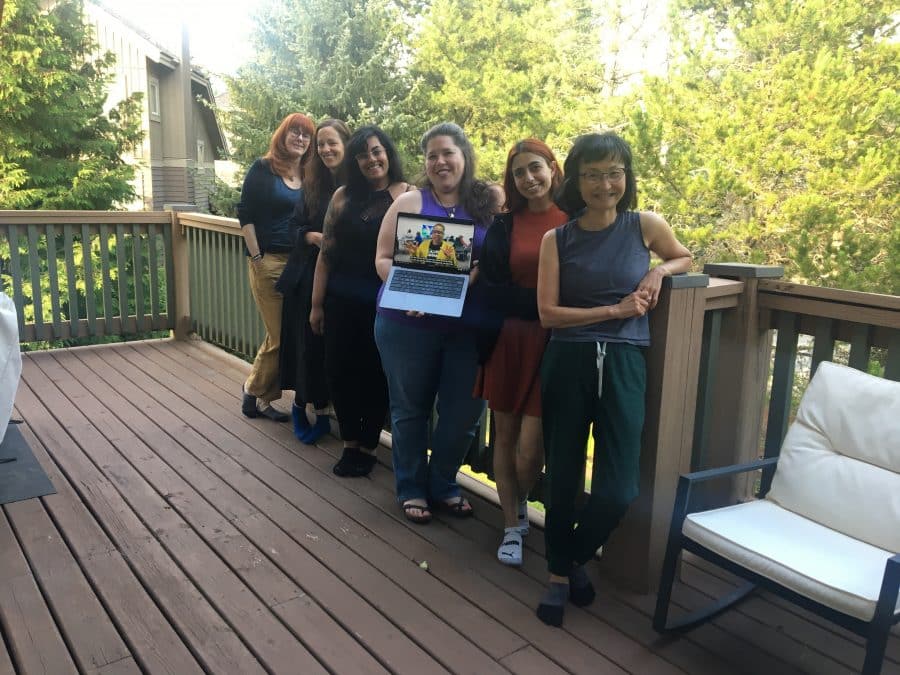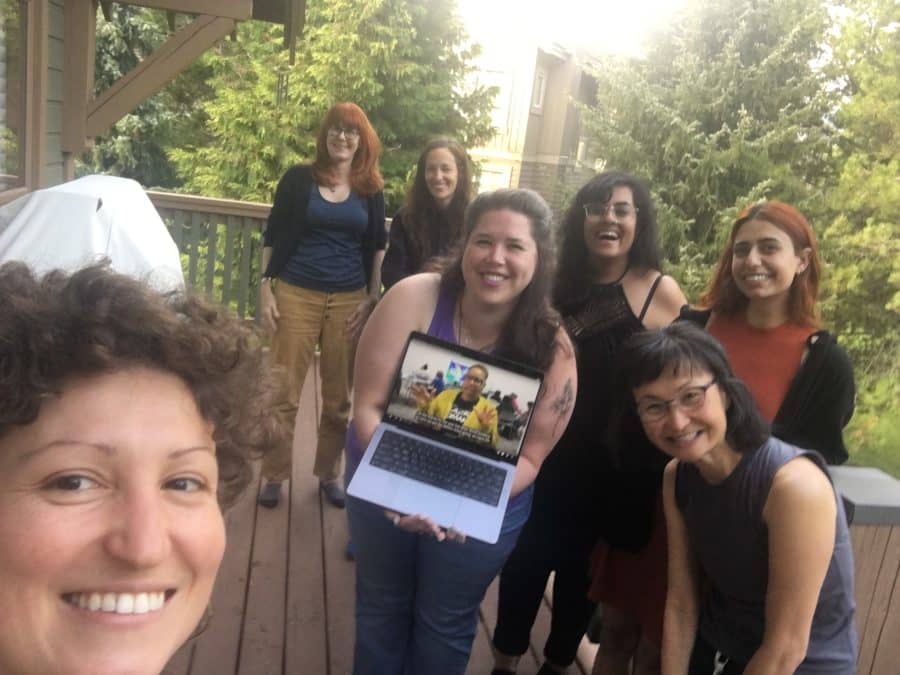Data Fluencies
Last July 29-Aug 2, 2024, we ran a Book Sprint with six brilliant women behind the Data Fluencies Stream at Simon Fraser University. Five of these academics joined us onsite at a lovely villa in Whistler, Canada while one joined remotely. The book was centered around the various projects of the Data Fluencies Stream at the Digital Democracies Institute in Simon Fraser University, which “produce[s] data fluencies and public knowledge through five intersecting projects that model a different type of community-engaged academic research.”
The book “offers data fluencies as a model for engaging theories of data justice, methods of community engagement, and practical approaches to disrupting institutions and infrastructures that have diminished the capacities and expertise of everyday users of digital technologies.” In the words of our authors themselves (emphasis ours):
Rather than viewing data as fixed or static, data fluencies move with, through, and against data streams to build the worlds we want, not the ones that algorithms suggest. Data fluencies are multivocal and emergent, making space for surprising solidarities that transcend difference; aspirational re-actions that allow for nuanced feeling; encounters that counter the proliferation of hate and toxicity online; and moments for play and co-creation that build with communities and people, not simply for them. The examples provided throughout the text weave the reader through real experiences in implementing these ideas, outlining challenges to and visions for disrupting the past to reimagine the future.
[…]
The approaches outlined here help us listen for the worlds that could have been, might have been, and still are. These are starting points for devising more ways to think, act, and imagine—to influence and reshape the currents that flow through our data-driven world.
A successful hybrid Book Sprint
This hybrid Book Sprint was an incredible success, moving swiftly and smoothly under the guidance of our facilitator Jana Mendelski and through the well-oiled collaboration of the authors. We are always happy to adapt the process to meet our partner’s needs, as is shown by the many formats we run in our Sprint Lab. Hybrid Sprint formats are one example of this, wherein our team works together with the partner and organizer to arrange for participants to join remotely. It takes preparation from our end to adapt some of the processes to accommodate online participants, and also commitment from the end of the online participants to be present in the activities.
“The author [who joined us] online was highly committed,” shared Book Sprints facilitator Jana. As this author was able to set aside time to be online, present, and participative in the discussion, it truly felt like she was there in the Book Sprint with the onsite authors. They also freely included her in the discussion, allowing her to jump in and contribute to the conversation easily – even for onsite activities such as brainstorming involving post-its. The online author was also involved actively in the writing process by always pairing her up with a partner to work with, accounting for the slight time difference. During the individual editing stage, she still stayed on the Zoom call to bring that sense of togetherness and of being part of the Sprint.

The authors collaboratively writing and ideating in the big, open space of the villa.
Jana also shared that it was helpful that these women, as academics, were well-versed not only in the topic of the book but also in having productive conversations amongst themselves. The writing process was smooth as the authors were writing about their own projects. As a facilitator, she was able to focus on ensuring everyone was on-track and contributing in their key areas.
This was echoed by one of our participants, Pippa Adams, in our catch-up call with her a month later. She shared that some participants were skeptical of the process and unsure if the output would be as successful as it was – they were pleasantly surprised that they got an entire book done in 5 days. As academics, they are used to their own processes of writing a book, so this was a new endeavor for them. Jana was helpful in gaining their buy-in to the process as it was going on and keeping everyone on top of things, regardless of any initial misgivings.
Spaces conducive for writing
With onsite Book Sprints, we often encourage our partner to select a venue that is conducive to the writing process. This Sprint was held in a beautiful villa – which brought its own set of advantages and challenges.

The villa that was the group’s home and ‘office’ for this Book Sprint in Whistler, Canada.
One feature of the space that was both an advantage and a challenge was the open layout of the space. While it was easy to gather everyone for discussion, it was difficult to disperse into private spaces as pairs or smaller groups for the actual writing. Some authors found it challenging to focus while hearing other conversations going on in the space, and so had to move to a separate location to get their work done. Jana and the authors were able to manage the situation with the available resources. This is a useful experience to note for venue-hunting for future Book Sprints!


Our brilliant female authors and facilitator pose for lovely group photos after a successful Sprint!
Congratulations once again to our authors and facilitator for a successful Book Sprint! We are honored to have been part of your efforts towards community-engaged academic research.
Keep an eye out for more Sprint updates in the future! Never miss an update with us by following us at the links below.
—
Got a great idea? Tell the world with us through a Book Sprint.
Send us a message on IG, LinkedIn, or at contact@booksprints.net
